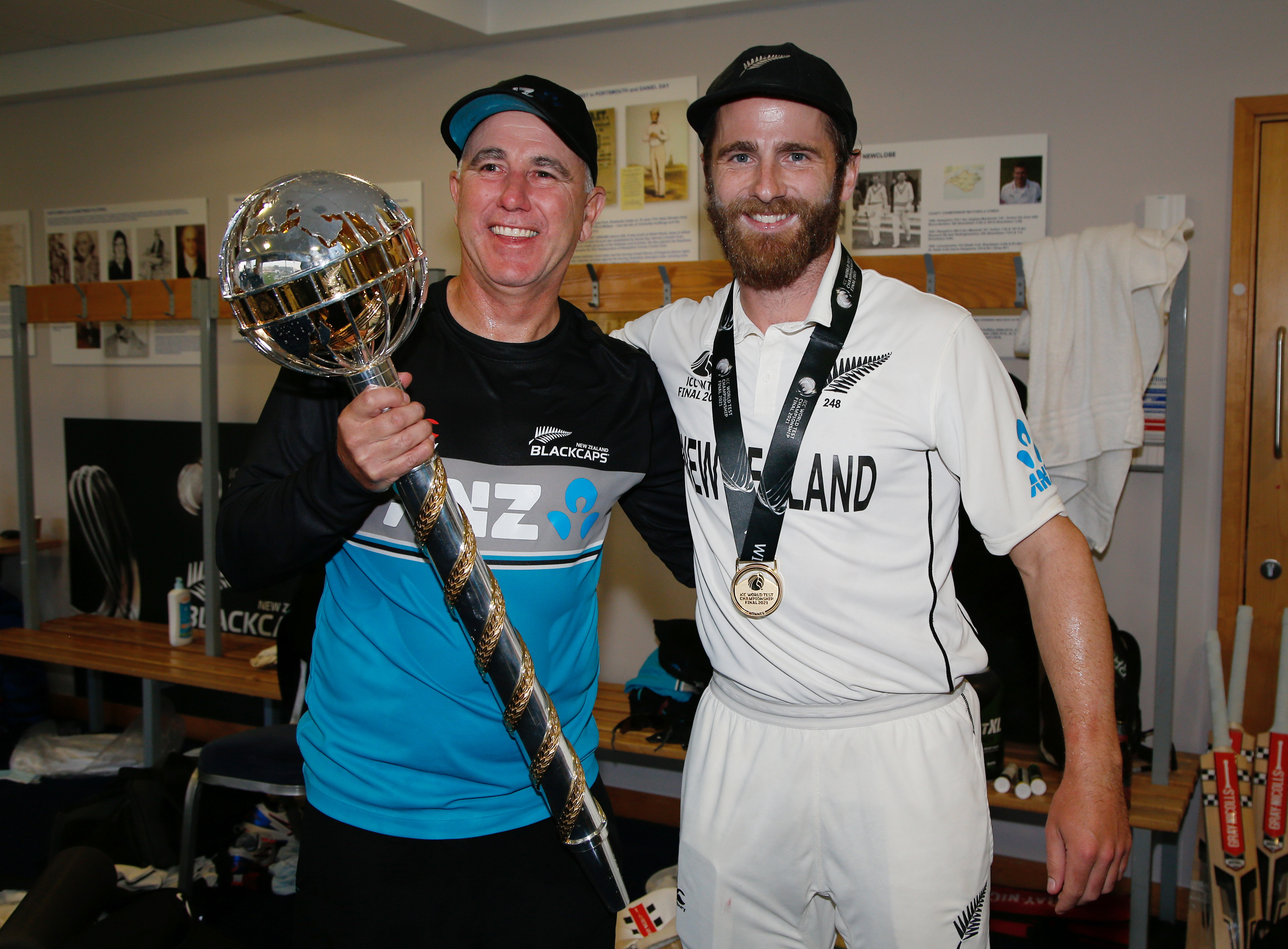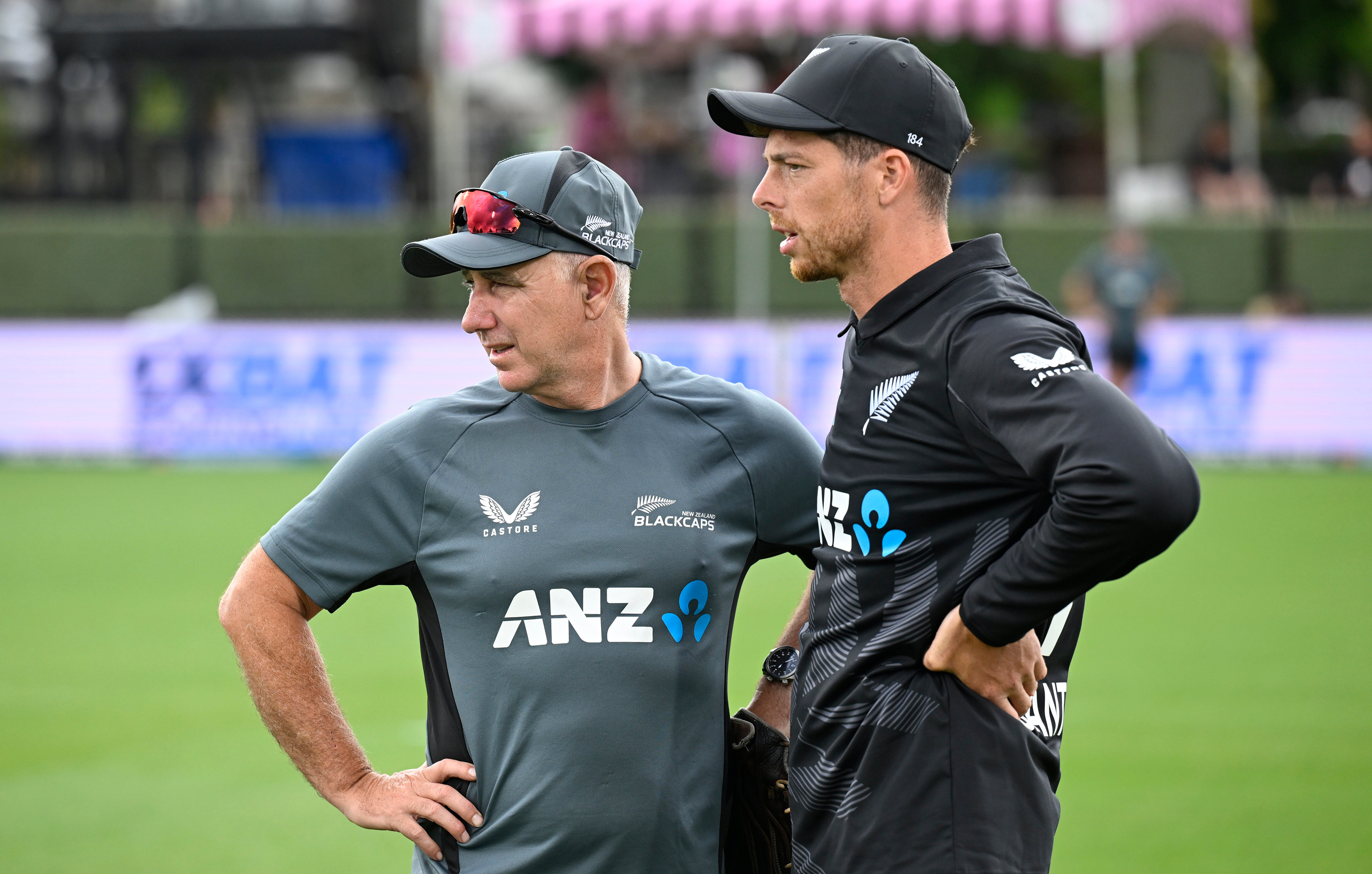Gary Stead
Gary Stead
- Coach Profile
Somewhat quietly, Gary Stead has put together an impressive record as Blackcaps coach over the past six and a half years. And that’s just the way he would want it. “I like to win but don’t let the results define me,” he says. “The results happen because of a group of people you have around you and the work you do together.”
The results of the team under his charge, in tests, one-day internationals (ODIs) and T20 cricket, make for some of Kiwi cricket fans’ greatest moments. Winning the World Test Championship, making the final of last year’s Champions Trophy, and the 2019 Cricket World Cup final, a match that will live in infamy. “What an amazing game of cricket,” Stead says philosophically. “We lost on a technicality, but I’m not sure there will be a much better cricket match played than that game, with all its ebbs and flows. I often say if I could live all the emotions I had on that day in a lifetime, it would be a pretty fulfilling life.”
A self-described purist who loves the longer format of the game, Stead counts his greatest achievement as 2024’s 3-0 test series win in India – something that no New Zealand side had ever accomplished, ending India’s run of 18 consecutive home series wins since 2012. “I look back now and pinch myself a little,” he says. “Winning the World Test Championship was a huge moment, but I think winning three away tests in India is actually harder to do.”
True to form, Stead had to be pushed to mention those on-field highlights. His first reply indicates where his heart lies in coaching – the players. “My strongest memories don’t necessarily come from winning or losing games, but the times you have in the dressing room afterwards,” he says, smiling. “That’s where you get the real connection. You see the joy on people’s faces, sometimes relief, the challenge, and guys working out ways to achieve their goals. That’s what I get the most pride out of.”
Stead recently announced he was stepping down as white ball (ODI and T20) coach. “My view is that after six and a half years, the team was probably due for a different voice,” he says. “We’re just over two years out from an ODI World Cup, so this gives a new coach two years to come in and get their feet right under the table before the tournament.”
There was a personal element to the decision, too. Professional sport requires a lot of time away from home, and from September through to the end of the Black Caps’ summer, Stead estimates he was only home for a total of 30 days. “It is a gruelling job, you’re on 24/7. You don’t get that time back. You know that’s what you sign up for, but it’s time to be fair to my wife and family and be home more.”
With that decision announced in April, Stead’s found himself reflecting on his career to this point. He coached at primary and secondary school levels before his first-class and international playing career took off, and as he neared retirement, found himself being pulled back towards coaching. A call from New Zealand Cricket’s then-CEO Martin Snedden, keen for someone to redesign their Level 3 coaching course, played a significant role in the decision. Traditionally a skills-based course, Stead saw an opportunity to broaden the development of emerging coaches. “Most people would come into that course with a fair understanding of batting and bowling, so I wanted to add some of the softer skills of coaching,” he recalls. Working with Canterbury University’s teachers college, he developed modules around leadership, coaching process, periodisation and long-term athlete development. “It was a way to professionalise the course a bit, helping to develop more self-awareness in coaches, understanding what coaching is truly about, and then apply that to cricket.”

He coached the White Ferns for four years from 2009 and then went on to coach the Canterbury men’s team for six years, before taking on the role with the Blackcaps. While he was thrilled to see the current White Ferns team win the T20 World Cup last year, he feels there is more that can be done for the women’s game. “One of the dangers in most sports is the idea that the women’s game needs to mirror the men’s, and it doesn’t have to all the time,” he says. “I have a daughter on the fringe of the Magicians (Canterbury’s women’s side) so I have an understanding at a couple of different levels. A lot less girls play the game than boys, so there needs to be a focus on attracting girls to experience cricket and making the game fun, especially when there are so many other options out there. Getting good coaches around these girls, who then make learning the skills and technique fun, helps set them up for success. And there’s also the opportunity to make adaptations to better suit women, rather than replicating the men’s game.”
Stead was appointed into the Blackcaps head coach position in 2018 on the heels of the Mike Hesson-Brendon McCullum era, with their attacking cricket reigniting the passion of players and fans alike, and boosting results, including the team’s first-ever appearance in a Cricket World Cup final. “When you come into roles like this, sometimes you need to decide very quickly if there is considerable change needed or not,” Stead says. “That environment was doing a lot of things very well at the time, so I used a strengths-based approach to continue that. I was conscious that if I pushed too hard, I could get a lot of pushback. The analogy I use is pushing a glass of water across a table; you want to move the glass, but you don’t want to spill much water.”
This is where the soft skills of coaching came in, with Stead making small changes in areas that needed attention, and giving his players ownership. “My overarching philosophy of developing self-sufficient players is based on the rationale that as a coach on the sideline in cricket, you’re very rarely making decisions in the heat of the moment that dictate the play. You have to develop trust in people and develop the necessary challenge at appropriate times,” he shares. This is also an approach he takes as head of the team’s support staff, managing the people around him who focus on their specific areas to support and drive the team. “If we are expecting that from the players, I’ve got to make sure my coaches are sharing that message, and that we have enough challenge within our coaching system to allow for really honest and frank conversations with each other.”
An alumnus of the Coach Accelerator programme, Stead’s always enjoyed networking with other coaches to swap stories and ideas. “Any opportunities high performance coaches can get to do that are really important,” he says. “Being amongst like-minded people, talking about ways to find improvements and get the best out of athletes, I think mentally that’s important. There’s no magic science in this space, so any PD you can get in that space is always valuable.”
With his immediate future not yet confirmed, Stead feels he has more coaching in him. Franchise cricket intrigues him, as something he has not experienced previously, but he’s also aware that many of the skills required to run a high-performing team transfer well into the corporate world. “I’m reasonably relaxed around what’s next,” he says. “The first thing is having a bit of a break and refresh, and then make sure that the next opportunity fits into the lifestyle I want to lead.”
Reflecting on his tenure has left him with some advice for fellow coaches. “Make sure you enjoy the moment. You can get so wrapped up in what needs to happen that you can run yourself into a brick wall. Look after yourself, so you’re your best for you and for your players.”

QUICK FIRE Q&A
Why did you get into coaching, and why did you stay in it?
I was often a captain and really enjoyed talking about the game with others and how they were playing. Coaching and helping others get through situations in the game seemed like it would be similar. The more I coached, the more I thought it was fun.
Who inspires you as a coach and why?
The players. They’re the ones who make me get out of bed every morning to put together a plan or have conversations around how we keep getting better. My family are also hugely important to me, especially my wife who has held the family together and allowed me to live out this dream.
What has been your biggest lesson in coaching?
Moving on quickly from mistakes. Fans might not want to hear it, but other coaches will understand – you’re going to make mistakes from time to time. You’ve got to quickly learn from them and let go. Being able to laugh at yourself is important too!
What’s been your biggest challenge?
When players retire or you have to drop them, that always plays heavy on your mind and your heart. I went through it as a player so I understand, this is their future, their income, and you always grapple with how you go about those situations. Time away from home would be another one.
How do you want to be remembered as a coach?
I firmly believe the game is about the players, not the coach. I hope that people would say that I showed care to the players. It can be cut-throat at the top, but I would hope to be remembered as a good person through all of that with a good mix of challenge and support.